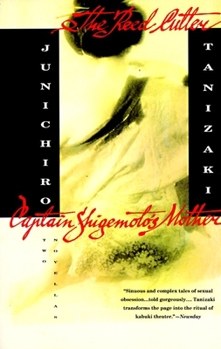The Reed Cutter and Captain Shigemoto's Mother: Two Novellas
Select Format
Select Condition 
Book Overview
With a precision and brilliance unmatched perhaps by any other novelist of the twentieth century, Junichiro Tanizaki interweaves a sense of his country's deep past with the kind of pathologies and obsessions we are likely to think of as modern. Here, in two eerie and beautiful novellas, he displays this skill at its most elegant and affecting. The Reed Cutter has a contemporary setting, though it might have taken place any time in the past thousand years. On a fine September evening, the narrator decides to make a solitary excursion to the site of an ancient imperial palace south of Kyoto, a place now lost and overgrown near the banks of a river. Musing upon old poems, passages of history, and topographical antiquities, he eventually finds himself among the reeds of a sandbar sipping sake from the bottle he has brought with him, watching the moon rise over the river, and scribbling bits of verse in his notebook. Suddenly he is surprised to discover that he is not alone. A strange man joins him and begins to tell a most extraordinary tale about his father, about a scene glimpsed in a moonlit garden forty years before, and about a mysterious woman who has become a lasting obsession. Captain Shgemoto's Mother is more violent but no less strange. It takes place in tenth-century Kyoto, in a world in which poetry and brutality, power and sexual impulse, shape the lives of the courtiers. Beginning in an almost whimsical vein with an account of the amorous exploits of a Heian Don Juan called Heiju, it gradually shifts mood to focus on three people--Shihei, the powerful Minister of the Left; his doddering uncle Kunitsune; and Kunitsune's ravishing and much-younger wife, a woman known only as Shigemoto's mother. How Shihei succeeds in taking Kunitsunes' wife away from him in the course of a bizarre and drunken party is a story as shocking--and memorable--as anything Tanizaki ever wrote.
Format:Paperback
Language:English
ISBN:0679757910
ISBN13:9780679757917
Release Date:June 1995
Publisher:Knopf Doubleday Publishing Group
Length:192 Pages
Weight:0.55 lbs.
Dimensions:0.6" x 5.2" x 8.0"
Customer Reviews
3 ratings
Obsession
Published by Thriftbooks.com User , 16 years ago
My reading of both these novellas is heavily influenced by having recently read Tanizaki's Naomi: A Novel, a story of obsession. Both stories in The Reed Cutter (and) Captain Shigemoto's Mother: Two Novellas are similarly about men obsessed with a certain woman. While Naomi has a personality, a rebellious streak and likes to have a good time, the objects of affection in these two stories have no personal characteristics. They are admired and pampered for their beauty. With no personality elements are ascribed to either of them, they are totally passive and show little to no feeling for others. They have no work, no defined interests, and I could not help but wonder what they did with their time. In these two novellas, there are social barriers that restrain communication and divide families. These are accepted, and seem to add to the mystic of the obsession. Like Joji, who accepts whatever crumbs of a relationship Naomi will give him, the men in these novellas are prepared to accept the longing, loneliness, drudge and/or humiliation that results from their obsession. In "Reeds", the Father gives up his life for what appears to be no more than an image. While the "Mother" title suggests this is about a mother-son relationship, there is more text and drama (the chamber pot and Contemplation of Impurity scenes are most memorable) devoted to those who are romantically obsessed with Shigemoto's mother than to Shigemoto's (also obsessive) relationship with her. Knowledge of The Tales of Genji, other Japanese classics and geography would enrich the reading of these stories. Knowledge of Japanese culture would be helpful too. Westerners can relate to the pedestal aspect of the stories since the adoration of female beauty as portrayed can be considered an extreme variation of the European tradition of courtly love. The last scene in Mother" has an unmistakable western counterpart. Tanizaki is known for his modern translations of The Tales of Genji. Very different from this work and these stories is his longer work The Makioka Sisters which must be a classic defining Japanese life just prior to WWII.
Haunted and haunting
Published by Thriftbooks.com User , 17 years ago
An acquaintance and interest in Japanese classical literature may be necessary to fully appreciate these novellas, but Tanizaki's refined prose and his subtle exposition of the various permutations of love, and its persistence beyond death, will haunt the sensitive reader. In "The Reed Cutter" a chance meeting by a riverbank on a moonlit night serves to recount the story of a tangled love affair that happened decades before. "Captain Shigemoto's Mother," set in the Heian period, will reward those who have read "The Tale of Genji." It tells of the love affairs of a renowned playboy, but also of an "abandoned" child whose longing for his mother colors his whole life.
Tanizaki Is A Master of Insight Into Desire and Loss
Published by Thriftbooks.com User , 26 years ago
Tanizaki's later works continued to look back at a Japan which was being enveloped by the necessities and temptations of the West, militarism, and false [and conservative]myths about feudal Japan. I love Tanizaki's The Makioka Sisters (I think that book is his masterpiece) but I very much like these two stories, particularly Captain Shigemoto's Mother. The story of a man trying to understand how his mother came to be lost to him is intriguing and moving. I hope the Japanese never forget Tanizaki; unfortunately, Americans barely know who he is.






